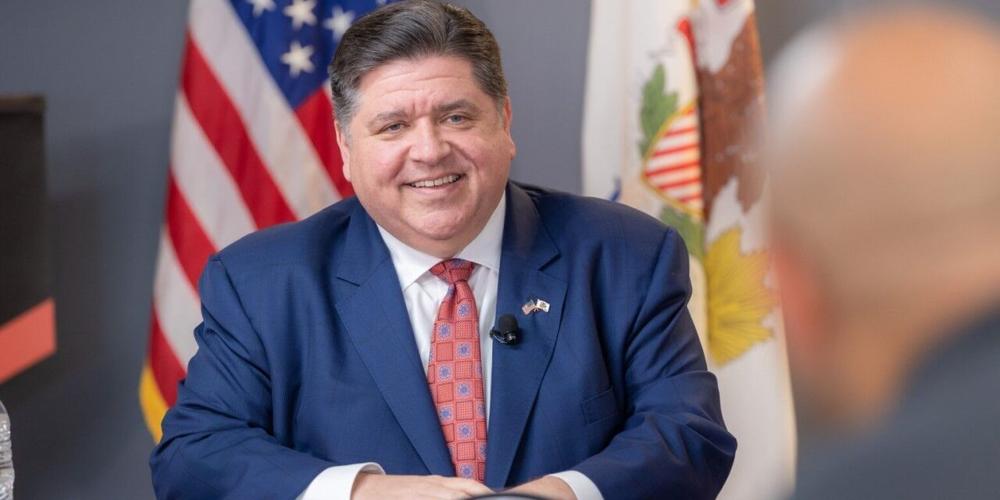
Illinois Gov. JB Pritzker
SPRINGFIELD, ILLINOIS - The constitutional clock has begun ticking for Gov. JB Pritzker to decide the fate of a new Illinois law that business groups and other observers warn will flood Illinois state courts with new lawsuits from throughout the country, harming Illinois' economy and increasing the burden on Illinois' state court system at the same time.
On June 30, Illinois lawmakers formally sent the legislation known as Senate Bill 328 to the governor's desk, seeking his signature.
Under the Illinois state constitution, Pritzker now has 60 calendar days to take action on the bill. He can either sign the measure into law or veto, or take no action. If he does nothing, the measure automatically becomes law at the end of the 60 day period.
Business groups and others are mounting a public campaign calling on Pritzker to veto the measure. Signing the law, they said, will deepen Illinois' reputation as being anti-business and run counter to Pritzker's stated goal to make Illinois "the best state to do business."
"This bill sends a chilling signal to companies across the country and around the world that Illinois may become an outlier in terms of litigation risk," said Lou Sandoval, president of the Illinois Chamber of Commerce in an emailed response to questions from The Record.
"It creates a new layer of legal exposure that will increase the cost of doing business, dissuade investment, and potentially deter job creators from expanding into or selling to Illinois. Over time, this kind of policy erodes the competitive position of our state in the national economy and is contrary to the goal of growing Illinois economy and creating ‘Illinois is open for business’ climate."
In the closing hours of the month of May, Democratic state lawmakers in Springfield rammed SB328 through the General Assembly. The legislation would rewrite the so-called venue rules for Illinois state courts, which govern who can be sued, where, and for what causes.
SB328 specifically would create a new "consent-by-registration" system in Illinois, under which companies from throughout the U.S. and the world could be dragged into courts in Illinois for certain kinds of claims, whether or not the company has any real presence in Illinois or if the alleged injury occurred in Illinois or can be traced back to conduct in the state.
To this point, Illinois courts have operated as so-called "specific personal jurisdiction" legal venues. Under such a system, plaintiffs attempting to sue companies in Illinois state courts needed to prove that the company had sufficient ties to the state or that an incident that caused the alleged harms happened in Illinois.
Such specific jurisdiction rules, which control in most U.S. states, have served to limit the legal exposure of companies which operate across state lines, limiting the ability of trial lawyers to "forum shop" by choosing to file lawsuits in court systems considered to be more friendly to their pursuit of massive verdicts and settlements, often worth many millions or even billions of dollars.
However, SB328 would remake Illinois' system to line up with the nation's biggest state court venue outlier, Pennsylvania.
Under Pennsylvania's system, trial lawyers are allowed to sue any company that has registered to do business there - a clerical act mandated by law in all 50 states, whether or not a company is headquartered in that state or operates in the state in any significant way.
This has led to a system under which most of all claims related to exposure to "toxic substances," such as pesticides and herbicides, pending in Philadelphia's Court of Common Pleas come from plaintiffs who don't live in Pennsylvania and weren't harmed in Pennsylvania, yet are suing companies that aren't based in Pennsylvania.
Under many of these claims, many millions or even billions of dollars could be at stake. The risk of such payouts have led agrochemical maker Syngenta, in particular, to ask the U.S. Supreme Court to rule Pennsylvania's consent-by-registration venue regime unconstitutional.
That petition remains pending before the high court. Justices on the court have indicated in a previous ruling that they could be open to striking down Pennsylvania’s law.
Without a definitive ruling from the Supreme Court, Illinois' Democratic lawmakers have moved at the urging of trial lawyers - some of their most generous and loyal political donors - to move Illinois' venue rules out of line with nearly all other states and more into line with Pennsylvania's.
Under SB328, Illinois law specifically would allow companies from anywhere, who have completed a registration form with the Illinois Secretary of State's office, to be sued for "injury or illness resulting from exposure to a substance defined as toxic" under Illinois state law "whether the cause of actions arises within or without the State."
Trial lawyers, who are among the most generous and loyal political funders of Democrats in Illinois, say the legislation is needed to protect Illinoisans against out-of-state companies.

Lou Sandoval
In an open letter published June 26 in Crain's Chicago Business urging Pritzker to sign SB328, Illinois Trial Lawyers Association President Timothy J. Cavanagh said SB328 is more limited in its scope and reach than Pennsylvania's legal venue regime.
Cavanagh asserted the law opens up Illinois courts to more "toxic substances" harm claims against out-of-state companies, but does not guarantee out-of-state plaintiffs the right to bring such suits. However, courts would have "discretion" to allow such out-of-state plaintiffs to use Illinois courts to file suit, Cavanagh said.
"Our state has long opposed predatory profiteering by providing a civil justice system in which everyone, regardless of their means, gets a fair shake," Cavanagh said. "SB 328 upholds that tradition by recognizing that the privilege of doing business here comes with the responsibility of not hurting Illinoisans."
Business groups, however, have urged Pritzker to veto SB328, saying the law is more about allowing trial lawyers to use Illinois courts to pad their profits than it is about preventing corporations from "predatory profiteering."
Almost immediately after SB328 was approved, Mark Denzler, president and CEO of the Illinois Manufacturers Association, and others dispatched letters to Pritzker, requesting a veto.
In the June 8 letter, Denzler noted the U.S. Supreme Court could strike the law down in the next year or two, along with Pennsylvania's regime.
"A general jurisdiction statute like SB 328 would likely be found unconstitutional under the dormant Commerce Clause because it both discriminates against out-of-state companies and imposes a significant burden on interstate commerce that outweighs any public interest in adjudicating claims with no connection to Illinois," Denzler wrote.
Further, Denzler noted Illinois' courts are already strained, with majorities of the state's county courts facing workforce shortages and increased caseloads and backlogs.
That assessment has been backed by the courts themselves, as chief judges have consistently asked for more money to increase staffing, including the number of judges on the bench. In the fall of 2024, for instance, the Illinois Supreme Court itself appointed 12 judges to the Cook County bench, even as those candidates were seeking election, saying the swift appointments were needed to address a shortage of judges in Cook County.
And Denzler agreed with the Illinois Chamber, other business organizations and other critics of the legislation that SB328 will harm the state's economy. He noted the legislation was opposed by "nearly every business segment in the state including retailers, restaurants, railroads, truckers, energy and more."
"There is no reason to rush and enact this law in Illinois that will harm efforts to grow the economy and burden our courts...," Denzler said.
"Illinois does not need another burden to overcome in attracting business."
Other business groups and legal reform advocates have also called on Pritzker to veto the legislation.
The Illinois Fertilizer and Chemical Association, for instance, issued such a statement, noting they believe SB328 "will add increased costs and lawsuits to an already overburdened court system," which they said already levies "one of the highest 'tort taxes' in the nation."
Economic research firm, The Perryman Group, has estimated "lawsuit abuse and excessive tort costs" in Illinois cost the state economy more than $21.3 billion annually.
"Illinois should not be 'America’s courtroom' and engage in litigation tourism," the IFCA wrote. "Pennsylvania is the only state to have enacted a statute, making Illinois an outlier as only the second state in the nation with this law and make it harder to attract economic development from out-of-state companies."
All of the business groups and other opponents of SB328 have encouraged Pritzker to follow the example set by his counterpart in New York, Gov. Kathy Hochul, who vetoed similar legislation twice in the past few years. In her veto message, Hochul said she believed such consent-by-registration venue rules would harm New York's economy by making the state less attractive to the businesses that drive economic growth.
Legal reform advocacy group, the American Tort Reform Association, has called SB328 "one of the single worst bills we have seen this year, nationwide."
ATRA noted Illinois' lawmakers have enacted legislation that is even "too anti-business for New York."
“If this bill becomes law, Illinois is likely to see a mass exodus of businesses leaving and a sharp decline in new business investments," said ATRA President Tiger Joyce.
But, Joyce said, “this won’t just hurt businesses — it will hurt Illinois families and small businesses, whose taxes fund the courts.
“As more out-of-state lawsuits flood the system, it will become harder for the people who actually live here to have their own cases heard quickly and fairly.”
Sandoval rejected assertions from trial lawyers that SB328's changes won't hurt Illinois' economy, as critics said. As Hochul asserted, businesses choosing not to invest in Illinois remains "a very realistic concern," should SB328 become law.
"When legal risk outweighs market opportunity, companies reevaluate their go-to-market strategies," Sandoval said. "Even a large and economically important state like Illinois is not immune.
"Businesses today have options: They can redirect investment to friendlier states, avoid direct-to-consumer sales in high-risk markets, or tighten contract terms to limit jurisdiction. The reality is that litigation risk is part of any company’s cost-benefit analysis and laws like SB328 shift that balance in the wrong direction."
Even as Pritzker decides whether to sign or veto SB328, Illinois Republican lawmakers have launched a legal effort to block the measure from becoming law.
On June 18, Republican lawmakers filed suit in court in Springfield, calling on the Illinois Supreme Court to ultimately declare Democratic leaders unconstitutionally rushed the measure through the General Assembly.
They specifically asserted Democrats violated a state constitutional provision requiring lawmakers to read legislation on three separate days in both the state House and Senate before giving it final approval. However, Republicans say Democrats used a controversial legislative tactic to bypass those rules and approve the new law in about 24 hours.
Further, the Republican lawmakers say Illinois House Speaker Emanuel "Chris" Welch and Senate President Don Harmon lied when they certified the measure abided by all constitutional mandates, including the so-called Three Readings Rule.
That lawsuit remains pending in Sangamon County Circuit Court.








